HP Z420 Workstation Review: Competition Heats Up
by Dustin Sklavos on May 21, 2012 12:00 AM ESTApplication and Futuremark Performance
It stands to reason PCMark is going to have a field day with the fast SSD used for the system drive and the eight-core, sixteen-thread Intel Xeon that's powering our HP Z420 review unit. What should be particularly interesting, however, will be our CPU-isolated benchmarks.
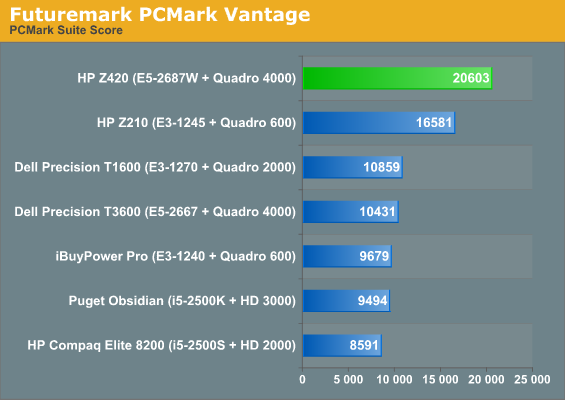
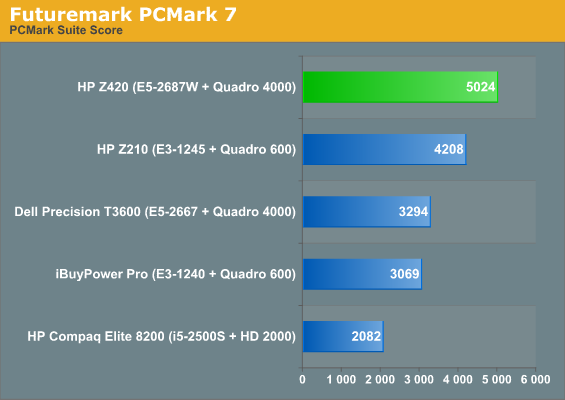
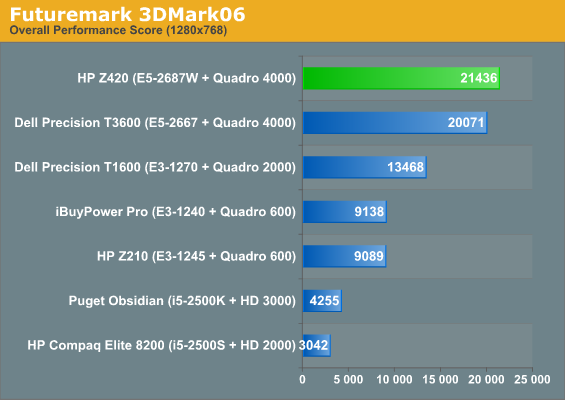
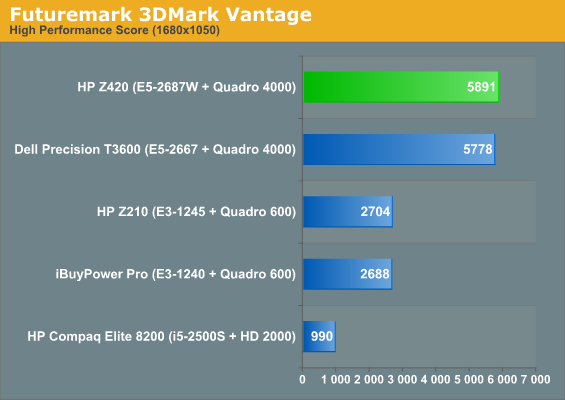
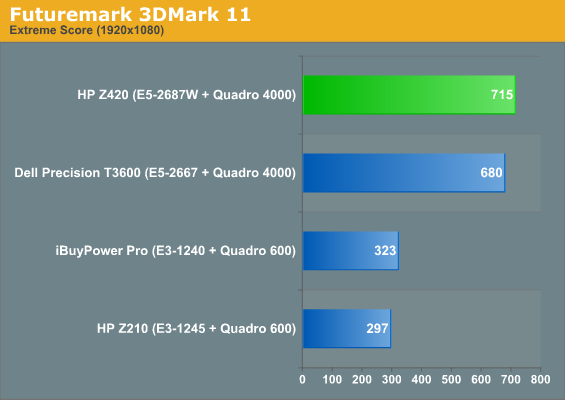
The Z420 runs away with PCMark while even the 3DMarks see a slight boost from the extra CPU performance on tap. It's just enough to put the Z420 ahead of the T3600 in every chart. For comparison's sake, it's worth noting that boutique gaming desktops with consumer-class SSDs (tuned more for performance than reliability) pretty much start at where the Z420 lines up in PCMark, while even a 768MB GeForce GTX 460 offers a better gaming experience than the Quadro 4000. Bottom line: this is not a gaming system.
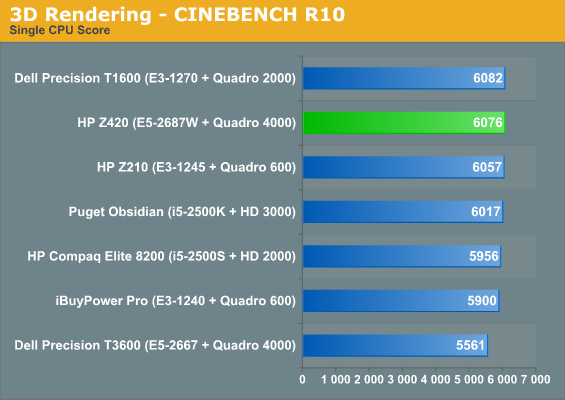
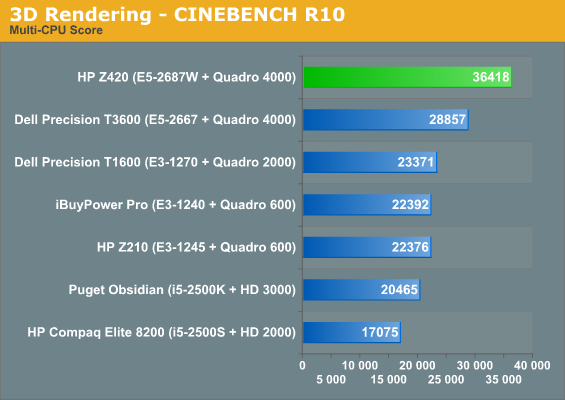
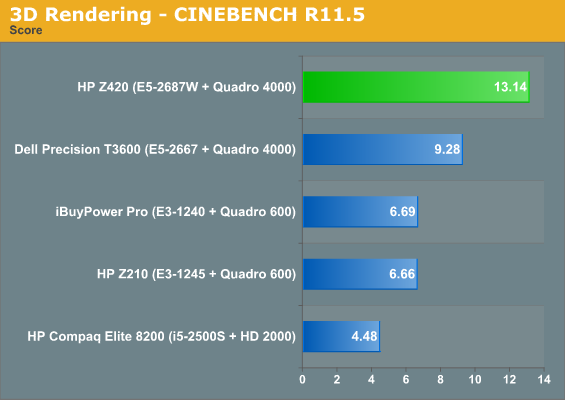
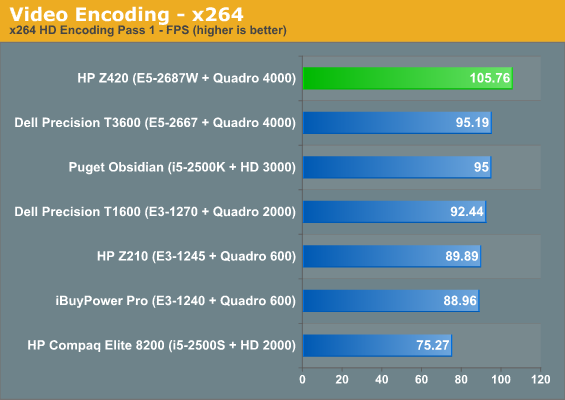
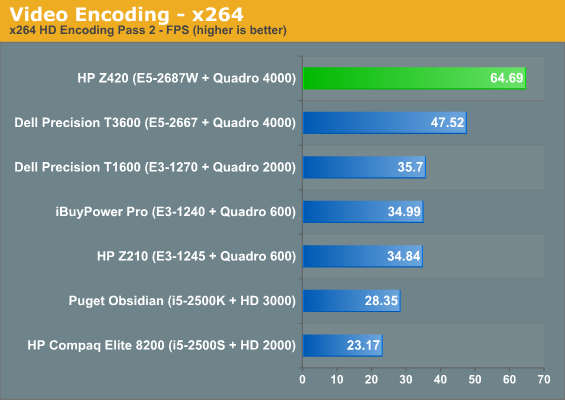
In single-threaded tasks the E5-2687W is certainly respectable, but the instant the extra cores can be leveraged it tears past the other test systems. It takes a 4.6GHz i7-3960X to even match or beat the Z420's E5-2687W (as tested here), but the fact that a hexa-core chip can beat an octal-core chip in these tasks is telling. The E5-2687W is probably going to be the fastest workstation chip you can find and the Z420 demonstrates that, but enthusiasts who've periodically looked at enterprise-class hardware are going to want to steer clear, as even modern video encoding tasks may not be adequately threaded to keep the E5-2687W working at full tilt.










35 Comments
View All Comments
jecastejon - Monday, May 21, 2012 - link
It can be done as BOXX among others do this all the time and they are always building and claiming the fastest and more reliable computers in content creation business, also you pay more for this, but at least you have the warranty of a serious and dedicated company.But, If you are not a real expert with Xeons why try to overclock them? Xeons are designed for reliability over long periods of constant use and not for the ultimate performance per core. But if you take them to the limits not knowing what you are doing it wont justify expending the extra they cost. You may get close to Xeons octacores overclocking a desktop sixcore. You will need some advise and experience either to make them really stable at high clocks, but at least you wont pay more.
Consider a very fast and overclocked desktop 6 core being as fast as a lower clocked 8 core Xeon. A desktop 3.4 GHZ 6 core CPU will cost you about 800-900$. A 2.2 octacore Xeon CPU will be around $1200.
Another option is to build a very fast 4 or 6 core machine to design and create your model and a second machine to speed up some rendering and simulation task if the software you use allows it.
Also, for simulation with Realflow get all the memory you can first and then use whats left in your budget for CPUs. Again, It is preferable to work slower but at a constant pace than to stop continually because you hit your memory limit.
I have a Xeon octacore for reliability and is running at the specified cycles, using very stable memory and power supply. But also I builded a machine with desktop and workstation parts to experiment a bit more.
On your request to Anandtech or other tech sites to include real 3D simulations with custom scenes on Realflow or other mayor software all I can say is you need to understand we are not a majority here or everywhere so you need to take notes from here and there and make up you mind.
Finally, take my advise an experience with a grain of salt and do your own research.
sicofante - Monday, May 21, 2012 - link
Current Xeons can't be overclocked, not by HP nor by Dell or BOXX. The latter can overclock the former generation of Xeons, as much as anyone using the EVGA SR-II motherboard. That's pretty it.Everybody is hoping some new overclockable Xeons to come along, since EVGA has created its SR-X for that, but there are no signs of them appearing any time soon.
mapesdhs - Tuesday, May 22, 2012 - link
Overclocking XEONs is not normally supported on professional
systems (except certain SGI/Rackable units). Nothing to stop you
using a XEON on a consumer board though and oc'ing it, which
will work well since XEONs have higher TDPs (my Asrock X58
Extreme6 has a XEON X5570).
The real question though, is it worth it? I've been doing lots of
tests. An oc'd SB can certainly match or beat a dual-XEON X5570,
but it does depend on the task. Even more interesting though, SPEC
Viewperf11 can run extremely well on a Quadro 600 even when
paired with a lowly i3 550, as long as it's oc'd nicely. Can't post
URLs here, so just Google for "Ian viewperf", it's the page on my
sgidepot site.
Ian.
disco4178 - Monday, May 21, 2012 - link
Hi!Just curious, are the HP Z620, Z820 and/or Z1 going to be reviewed? The Z420 is kind of the "boring" one in the family it seems. The machines listed here save for Z1 have been upgraded, but not to the extent of the Dells. It would be neat to see an in depth review of them as I can only find the rendered movies on HP's site for a look at the internals. They look pretty slick, and easier to service than the Z420.
USAllard - Monday, May 21, 2012 - link
I'd also like to see a review of specifically the Z620. Especially for a comparison between the dual 4-core 3.6GHz and dual 8-core 2.0GHz versions.Einy0 - Monday, May 21, 2012 - link
I work in IT part-time for two different companies. They both are hung up on Lenovo. I know both places also used Dell before Lenovo. I often wonder where exactly Dell went wrong. I know their quality levels dipped for a few years. Has Dell fixed those issues yet?tech6 - Monday, May 21, 2012 - link
While certifications are important, both the Dell and HP products represent dubious value when compared to properly configured PCs. The $2k alone for the CPU yields very little marginal performance over a $1,000 or even $500 PC CPU. The whole package at $6K+ simply doesn't outperform a properly configured PC at half the cost by enough to justify that price tag.Kaldor - Monday, May 21, 2012 - link
Definitely! Alot of time it seems like IT departments get caught up in specs like raw CPU power and forget that upgrades like more RAM or a SSD make for a better user experience. Unless you can absolutely justify the cost of a processor and it will actually pay for itself, then spending this kind of coin is not worthwhile.I went through something similar to this about 3 months ago for CAD machines. They were convinced by the prior IT staff they needed workstation class CPUs (Xeon) and GPUs (Nvidia or ATI). There was no real need for a workstation class CPUs and GPUs for the type of CAD work my company does, so we went with Dell Optiplex 790's with an i7-2600, 16 gigs of RAM, a 256 gig SSD, 1tb spinning drive, and an ATI video card for easy 2-3 monitor setups. We spent about $1500 per machine and I havent heard any complaints from the engineers yet.
jecastejon - Monday, May 21, 2012 - link
Well, I will at least recommend a Xeon among several desktop machines. It will give you a real perspective on what a Xeon is and is better at. And that is, being the last machine up and running close to 24/7. It wont be the fastest in the short term but if your work depends on reliability for long periods of time, get at least one Xeon.Also if you go for a certified Xeon machine you will enjoy a smother experience running your software.
For an upgrade in 3D get all the memory you can if you work with complex scenes.
it all depends on what you do and with your experience.
theSeb - Monday, May 21, 2012 - link
You're missing the whole point of a Xeon CPU and it's uses. Some people need a workstation CPU and ECC memory. You obviously dont' and that is ok. A xeon-based workstation is not appropriate for your uses, but don't try to paint everyone with that brush.